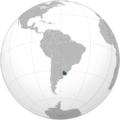Difference between revisions of "Uruguay Energy Situation"
***** (***** | *****) m (→Introduction) |
***** (***** | *****) |
||
| (5 intermediate revisions by 3 users not shown) | |||
| Line 1: | Line 1: | ||
| + | |||
{{CES Country|CES Country Name=Uruguay | {{CES Country|CES Country Name=Uruguay | ||
|CES Country Capital=Montevideo | |CES Country Capital=Montevideo | ||
| − | |CES Country Region=Latin America | + | |CES Country Region Latin America=Latin America |
|CES Country Coordinates=34.8833° S, 56.1667° W | |CES Country Coordinates=34.8833° S, 56.1667° W | ||
}} | }} | ||
| + | = Introduction = | ||
| + | |||
| + | Uruguay is located to the southeastern part of South America and is home to 3.3 million people. It is a democratic constitutional republic where the president is both the head of state as well as the head of the government.<ref> Reegle, retrieved from:http://www.reegle.info/countries/uruguay-energy-profile/UY</ref> | ||
| + | |||
| + | <br/> | ||
| + | |||
| + | = Energy Situation = | ||
| + | |||
| + | = Renewable Energy = | ||
| + | = Fossil Fuels = | ||
| + | = Key Problems of the Energy Sector = | ||
| + | = Policy Framework, Laws and Regulations = | ||
| + | = Institutional Set up in the Energy Sector = | ||
| + | |||
| + | = <span style="background-color: rgb(255, 255, 255);">Other Key Actors / Activities of Donors, Implementing Agencies, Civil Society Organisations</span><br/> = | ||
| − | |||
| − | |||
| − | = | + | = Further Information = |
| + | * [https://www.ptb.de/cms/en.html PTB] project "[[:File:PTB_project_Mercosur_95301_SP.pdf|Fortalecimiento de la Infraestructura de la Calidad para la eficiencia energética de artefactos electrodomésticos]]" MERCOSUR | ||
| + | * PTB project "[[:File:PTB_project_LAC_Energy_95309_EN.pdf|Quality Infrastructure for Energy Efficiency and Renewable Energy]]" in Latin America and the Caribbean | ||
= References = | = References = | ||
| − | |||
| + | <references /> | ||
| + | |||
| + | [[Category:Latin_America]] | ||
[[Category:Uruguay]] | [[Category:Uruguay]] | ||
| − | |||
| − | |||
Latest revision as of 10:40, 11 September 2020
Capital:
Montevideo
Region:
Coordinates:
34.8833° S, 56.1667° W
Total Area (km²): It includes a country's total area, including areas under inland bodies of water and some coastal waterways.
176,220
Population: It is based on the de facto definition of population, which counts all residents regardless of legal status or citizenship--except for refugees not permanently settled in the country of asylum, who are generally considered part of the population of their country of origin.
3,422,794 (2022)
Rural Population (% of total population): It refers to people living in rural areas as defined by national statistical offices. It is calculated as the difference between total population and urban population.
4 (2022)
GDP (current US$): It is the sum of gross value added by all resident producers in the economy plus any product taxes and minus any subsidies not included in the value of the products. It is calculated without making deductions for depreciation of fabricated assets or for depletion and degradation of natural resources.
71,177,146,197 (2022)
GDP Per Capita (current US$): It is gross domestic product divided by midyear population
20,795.04 (2022)
Access to Electricity (% of population): It is the percentage of population with access to electricity.
100.00 (2021)
Energy Imports Net (% of energy use): It is estimated as energy use less production, both measured in oil equivalents. A negative value indicates that the country is a net exporter. Energy use refers to use of primary energy before transformation to other end-use fuels, which is equal to indigenous production plus imports and stock changes, minus exports and fuels supplied to ships and aircraft engaged in international transport.
44.43 (2014)
Fossil Fuel Energy Consumption (% of total): It comprises coal, oil, petroleum, and natural gas products.
46.27 (2014)
Introduction
Uruguay is located to the southeastern part of South America and is home to 3.3 million people. It is a democratic constitutional republic where the president is both the head of state as well as the head of the government.[1]
Energy Situation
Renewable Energy
Fossil Fuels
Key Problems of the Energy Sector
Policy Framework, Laws and Regulations
Institutional Set up in the Energy Sector
Other Key Actors / Activities of Donors, Implementing Agencies, Civil Society Organisations
Further Information
- PTB project "Fortalecimiento de la Infraestructura de la Calidad para la eficiencia energética de artefactos electrodomésticos" MERCOSUR
- PTB project "Quality Infrastructure for Energy Efficiency and Renewable Energy" in Latin America and the Caribbean
References
- ↑ Reegle, retrieved from:http://www.reegle.info/countries/uruguay-energy-profile/UY





















